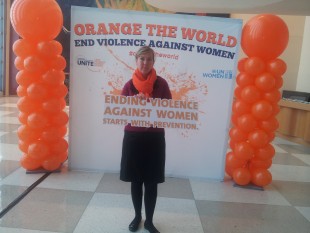Major Rachel Grimes understands how rape and violence are being used as cheap weapons.
Despite its devastating role in conflict, sexual violence has not traditionally been considered in military doctrine, by military planners or by soldiers on the ground.
And that’s where Rachel comes in. Currently acting as a Gender Advisor for the UN, Rachel’s previous roles have included designing and delivering a training package for the Peshmerga, in Erbil, Kurdish Region of Iraq.
Here she explains the need for all Armed Forces to understand the effects sexual violence in conflict and why it should be stopped.
What and why does a soldier need to know about sexual violence in conflict? These are questions I have been asked by British soldiers, international military institutions and even members of the UN, where I sit today. In conflict, sexual violence is as ancient as war itself and remains the cheapest weapon system. Today the impact of sexual violence in conflict reverberates beyond the individual and is a battleground of ideologies. The use of sexual violence in conflict affects the individual, impacts on the community and prevents any stabilisation process – even after the likes of Boko Haram or Daesh have disappeared. The violent treatment of women and some men, at the hands of these extremists is also a message, delivered by the media, to democratic states who value a human’s right to live in safety. Globally, politicians and the UN are aware “something must be done” for strategic security reasons as well as from a moral imperative. Soldiers who are involved in stabilising post-conflict areas are rightly viewed as one of the tools to address sexual violence.
Armies need to be as aware of the use of sexual violence in conflict as much as they are of an “enemies” capabilities. Protecting women and men from sexual violence is as tactically important as protecting them from weapons. The human body, usually a woman’s or a girl’s, is now like “vital ground”. Rape is as mentally debilitating as an IED. Perhaps you think that to lose a limb is beyond comparison? After having met women in the Democratic Republic of the Congo (DRC), obliged to live outside of their communities with their children born out of rape, or learning of the fate of girls who escaped Daesh but were then killed for losing their “honour”, I understand that for those survivors death may be more appealing. Indeed this has been witnessed in the number of suicides committed by women who have been freed or escaped from their captors in Mosul and Raqqa.
It is one thing to accept that sexual violence should now be considered by politicians and the military - but what can a soldier do? Through my work with the UN and 77 Brigade I have seen an evolving approach of peacekeepers and British soldiers towards sexual violence.
In DRC the use of servicewomen to engage with local Congolese women was ground breaking. The Swahili speaking Tanzanian soldiers were able to engage with Congolese women who told them when and where the combatants were most likely to attack. This improved the Force’s situational awareness. Service women, often viewed as the “third sex”, can engage with women and men. Survivors of rape – be they male or female, prefer to talk to women. They are a Force multiplier, yet not enough of them deploy.
In Erbil, the UK led the way when members of 77 Brigade deployed a Protection of Civilians training team. The team of two designed and taught European and Peshmerga soldiers how they should respond to survivors of rape. Due to a dominance of male soldiers in the Peshmerga patrols it was highly likely that the Peshmerga would be the first people escapees from Mosul or Sinjar would meet. It was important for them to be taught a list of Do’s and Don'ts when responding to survivors of sexual violence. The list was drafted by 77 Brigade staff in collaboration with UN civilian agencies and Kurdish civil society groups.
Today the MOD is working to provide soldiers with specialised pre-deployment training to provide them with the necessary awareness and understanding of gender issues within conflict. In addition some military personnel in 77 Brigade are being trained to become Gender Advisors. This is an indication that sexual violence is no longer viewed as a by-product of war but something the military should be aware of and be able to respond to.
If a military can’t protect the civilians it is mandated to protect then why is it there? I say civilians deliberately because there is a tendency to focus on women and girls as the only targets of sexual violence. We should remember that men can also be victims of sexual violence thus instead of “Ending Sexual Violence Against Women” let’s aim for “Ending Sexual Violence”.

